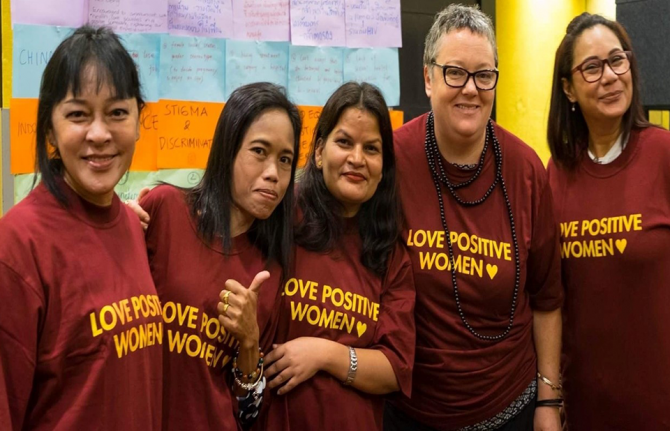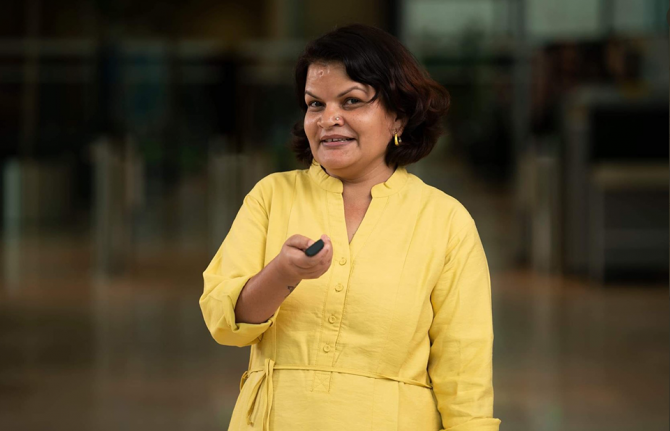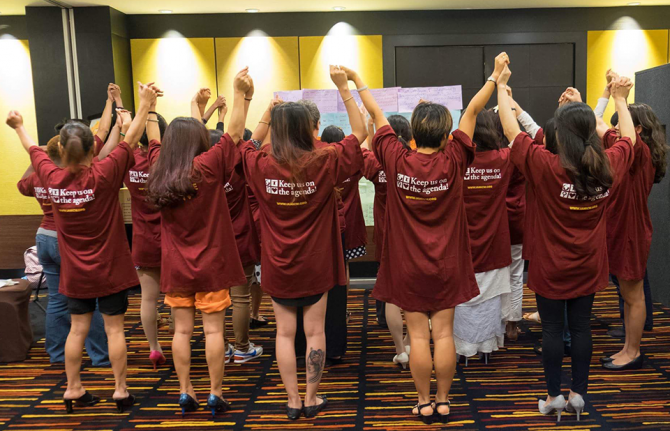



Feature Story
Asia Pacific women living with HIV speak out about rights violations
08 March 2023
08 March 2023 08 March 2023Nirmala Singh (not her real name) found out she was HIV positive after being tested during pregnancy. It was a surprise diagnosis, but she immediately knew how she had been infected. Before getting married she was raped. Nurses informed Nirmala’s husband of her positive result without her consent. She was immediately kicked out the home.
Sita Shahi, Regional Coordinator of the International Community of Women Living with HIV in Asia and the Pacific (ICWAP), has responded to this and many similar cases in her native Nepal.
“There is very little understanding of the rights of women living with HIV and how their experience is impacted by abuse,” Ms Shahi said. “Women are blamed for transmitting HIV because they are usually first in the family to be diagnosed. That is the starting point for them to experience human rights violations like intimate partner violence in the home and gender-based violence in the wider society.”
At a UNAIDS-supported ICWAP workshop organized in 2022 with participants from countries across the region, women living with HIV shared their personal stories.
One participant who was diagnosed during pregnancy was refused care by staff during childbirth. She delivered her baby on the floor of her ward, alone.
Some who have survived domestic violence said they were rejected by shelters run by government and non-governmental organisations based on their HIV status.
And there was consensus that in all countries domestic violence is common, but rarely reported.
The concerns of women living with HIV in the Asia Pacific region have remained relatively hidden and ignored. Rates of new infections and AIDS-related deaths among men in the region are more than double those of women. But for the estimated 2.2 million women living with HIV in Asia and the Pacific, smaller numbers do not mean smaller problems.
“Women in Asia and the Pacific continue to face discriminatory policies, social and cultural barriers, inequalities in healthcare access and threats to their security that violate their rights,” said UNAIDS’ Regional Adviser for Community-Led Responses, Michela Polesana.
“When women are free of any kind of stigma and discrimination, gender-based violence or breach of confidentiality by healthcare providers there is no accusing epidemic,” Ms Shahi reflected. “If a woman is free of violence at the policy level, society level and family level she can be mentally strong and her health could be as well as other people’s. Then there is no problem taking care of herself and her family while contributing to the economy.”
As a regional network, ICWAP is working to increase the capacity of organisations for and by women living with HIV so they can advocate around these issues at national level. A key priority is giving stakeholders including healthcare providers the information they need to help uphold the rights of women living with HIV.
One critical element of this strategy has been equipping its membership to advocate effectively using digital tools and spaces. UNAIDS supported social media advocacy training for ICWAP’s Young Advocates Social Media Team. Through the eight-week process, participants were introduced to social media basics, explored sexual and reproductive health and rights issues and practiced skills such as interviewing, blogging and editing.
“We embrace the role of technology in not only providing a space for community-building and psychosocial support for women living with HIV, but also the means to speak out about issues that affect them,” Ms. Polesana said.
To empower women living with HIV to meaningfully engage in decision-making spaces, ICWAP also held a feminist movement building training for women-led networks from six countries. This exercise built the capacity of women living with HIV to engage in programmes that promote gender equality and human rights and to lead advocacy efforts for high quality life-saving services for women and girls across the region.
On International Women’s Day 2023 under the theme “DigitALL: Innovation and technology for gender equality”, ICWAP called for the following:
- User-friendly digital platforms
- Access to the internet and digital tools
- Capacity building around social media advocacy
- Strengthened data security and redress mechanisms
- Online reporting mechanisms and rapid response for intimate partner violence
- Strategies to increase the economic empowerment of women living with HIV
Region/country
- Asia and Pacific
- Australia
- Bangladesh
- Bhutan
- Brunei Darussalam
- Cambodia
- China
- Democratic People's Republic of Korea
- Federated States of Micronesia
- Fiji
- India
- Indonesia
- Islamic Republic of Iran
- Japan
- Kiribati
- Lao People's Democratic Republic
- Malaysia
- Maldives
- Marshall Islands
- Mongolia
- Myanmar
- Nauru
- Nepal
- New Zealand
- Pakistan
- Palau
- Papua New Guinea
- Philippines
- Republic of Korea
- Singapore
- Solomon Islands
- Sri Lanka
- Thailand
- Timor-Leste
- Tonga
- Tuvalu
- Vanuatu
- Viet Nam
- Samoa



